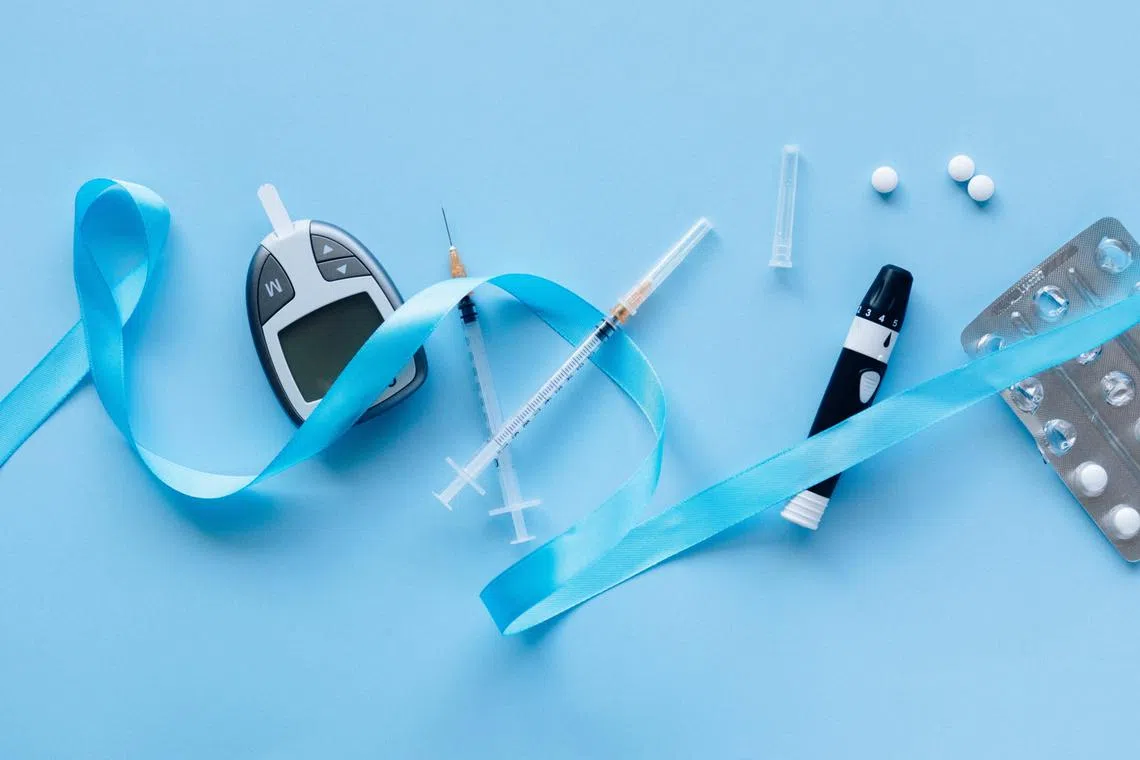New study to cut Type 2 diabetes risk in mums to look at mental well-being and sleep
Sign up now: Get ST's newsletters delivered to your inbox

Type 2 diabetes is a long-term medical condition in which one’s body does not use insulin properly.
PHOTO: PEXELS
SINGAPORE – A new four-year study aims to help women who have had diabetes while pregnant cut their risk of developing Type 2 diabetes later in life, by studying health factors such as mental well-being and sleep.
The study will assess the efficacy of a digital intervention, which focuses on diet, physical activity, sleep and mental well-being, on the glucose regulation of 400 women between the ages of 21 and 45 who previously had gestational diabetes.
The study is led by the Singapore Institute for Clinical Sciences (SICS) at the Agency for Science, Technology and Research, in collaboration with the National University of Singapore’s (NUS) Yong Loo Lin School of Medicine and the Singapore-ETH Centre.
A pregnant woman can develop gestational diabetes when her body does not produce enough insulin or does not use insulin effectively due to hormonal changes.
The Growing Up in Singapore Towards Healthy Outcomes, or Gusto, study published in 2021 found that one in five expectant mothers in Singapore has gestational diabetes. These women are 12 times more likely to develop Type 2 diabetes within four to six years after giving birth.
Type 2 diabetes is a long-term medical condition where one’s body does not use insulin properly, and people at risk of it include those who are aged 45 and older, have a family history of diabetes, or are overweight.
Professor Johan Eriksson, the lead researcher of the study, said there are many reasons women who have gestational diabetes have a higher risk of Type 2 diabetes. One is increased weight gain during pregnancy, and another is that both disorders share a large number of genetic risk factors.
Lifestyle modifications like improving dietary intake and mental well-being and more physical activity can prevent or delay the onset of Type 2 diabetes, but limited studies have been conducted with Asian populations.
Unlike other diabetes studies that looked only at physical activity and diet, the upcoming study also seeks to prompt women to take steps to improve their sleep and mental well-being, to determine if these changes reduce their risk of Type 2 diabetes.
Prof Eriksson pointed out that diabetes and depression are closely linked, and that those with Type 2 diabetes have a twofold to threefold higher risk of depression and anxiety.
“But it’s a chicken-and-egg paradox, and which comes first? It’s not really known. But there have been studies showing that if you treat depression in an individual at risk of developing Type 2 diabetes, the risk of developing it is lower,” he said.
“And if you treat depression in an individual with Type 2 diabetes, you get better glycemic control (that is, appropriate levels of blood sugar concentration).”
Why the two conditions are linked is unclear, he added, but theories include depressed people having less motivation to eat healthily and exercise, and high levels of stress hormones making the body less sensitive to insulin.
Too little or too much sleep has been linked to a higher likelihood of developing Type 2 diabetes.
Study participants will wear a digital ring tracker to accurately measure their sleep or wake states for eight weeks.
The researchers are hoping to recruit 400 Chinese, Malay or Indian women between the ages of 21 and 45 who had gestational diabetes in the past decade, but have no current or past major health conditions, and are currently not expecting.
They will have to install the Happy app on their personal smartphones. “Happy” stands for “Harnessing human potential and improving health span in women and their children study”, which is the name of the study.
Developed by SICS, the Happy app will allow participants to track their health data such as body mass index, blood pressure, and records of their diabetes screening test reports. It will also provide health tips from the Health Promotion Board and HealthHub.
For the first six months, half of the participants will be in an intervention group and will use an app called LvL Up, a smartphone-based chatbot that provides personalised lifestyle coaching to guide participants in attaining specific goals.
These goals include cultivating healthier eating habits, increasing physical activity and enhancing mental wellness. The app offers other features such as tips and suggestions on breathing exercises, steps tracking, diet logs and journaling tools.
Lvl Up was created by the Singapore-ETH Centre in collaboration with Nanyang Technological University and NUS, and some prompts include how to manage stressful situations, and not to use a smartphone before bedtime.
All participants will undergo a set of laboratory tests like blood tests to assess their glucose and lipid levels, full blood count and liver enzymes, and questionnaires assessing their own and their child’s physical activity, diet, sleep and mental well-being.
All participants will also have regular diabetes screening from the second to the fourth years.
As a secondary goal, the study will also look at whether the LvL Up lifestyle app will have a positive impact on the participants’ children.
Children born to mothers with gestational diabetes face an increased risk of obesity and diabetes, and it is believed that a healthy lifestyle among the women will influence the lifestyle of the whole family, said Prof Eriksson.
Prof Eriksson said he hopes that if the LvL Up app is proven to work, then the chatbot can be deployed in the healthcare system to prevent Type 2 diabetes in high-risk groups.
“(Healthcare workers) don’t have resources to engage high-risk individuals on a one-on-one basis, so if the app works, we could employ it in the system... and it is a straightforward way (of managing diabetes risk).”



